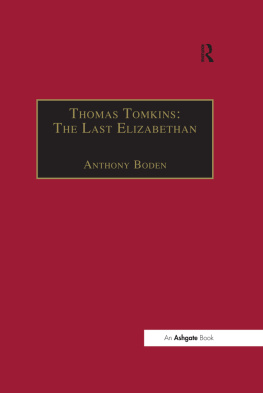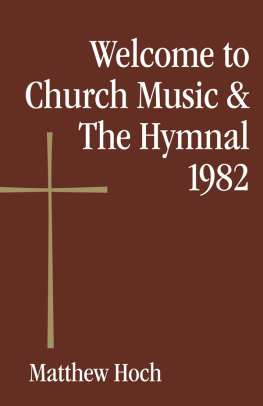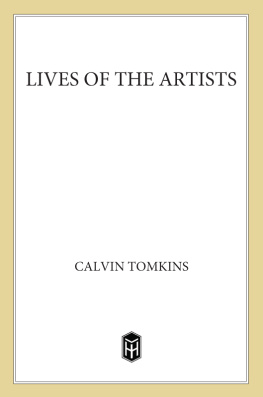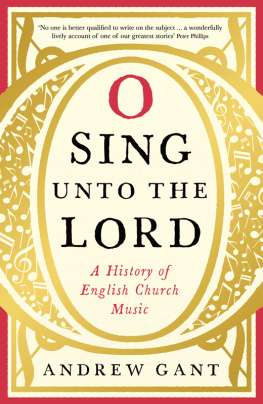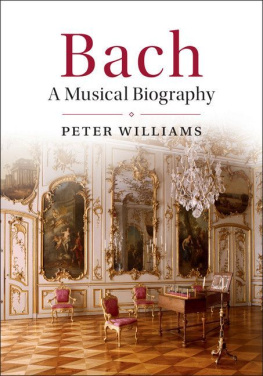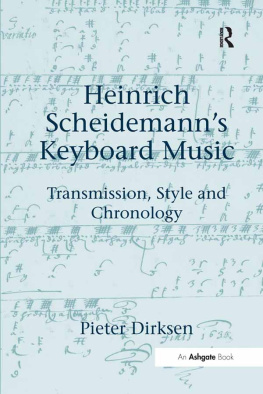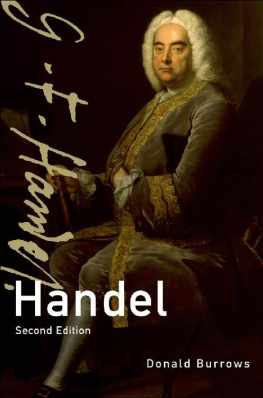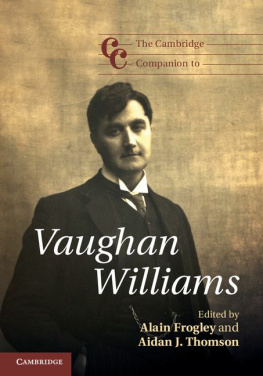THOMAS TOMKINS: THE LAST ELIZABETHAN
For Gregory and Thomas with a grandfather's love
Thomas Tomkins: The Last Elizabethan
Edited by
Anthony Boden
With commentaries on Tomkinss music
by
Denis Stevens
Bernard Rose
Peter James
and
David R.A. Evans
First published 2005 by Ashgate Publishing
Published 2016 by Routledge
2 Park Square, Milton Park, Abingdon, Oxon OX14 4RN
711 Third Avenue, New York, NY 10017, USA
Routledge is an imprint of the Taylor & Francis Group, an informa business
Copyright The individual contributors, 2005
The individual contributors have asserted their moral right under the Copyright, Designs and Patents Act, 1988, to be identified as the editors of their chapters.
All rights reserved. No part of this book may be reprinted or reproduced or utilised in any form or by any electronic, mechanical, or other means, now known or hereafter invented, including photocopying and recording, or in any information storage or retrieval system, without permission in writing from the publishers.
Notice:
Product or corporate names may be trademarks or registered trademarks, and are used only for identification and explanation without intent to infringe.
British Library Cataloguing-in-Publication Data
Thomas Tomkins: The Last Elizabethan
1. Tomkins, Thomas, 15721656 2. Tomkins, Thomas, 15721656 Family
3. Composers England Bibliography 4. Music England 17th century
History and criticism 5. Music England 16th century History and criticism
6. Worcester (England) History
I. Boden, Anthony II. Stevens, Denis 19222004 III. Bernard Rose 191696
IV. Peter James V. David R.A. Evans
780.92
Library of Congress Cataloging-in-Publication Data
Thomas Tomkins: The Last Elizabethan / edited by Anthony Boden.
p. cm.
Includes list of works.
Includes bibliographical references (p. ) and index.
ISBN 0754651185 (alk. paper)
1. Tomkins, Thomas, 15721656. 2. Composers England Biography. I. Boden,
Anthony.
ML410.T65T56 2005
780.92dc22
2004013967
ISBN 13: 978-0-7546-5118-5 (hbk)
Contents
Guide
Anthony Boden is a writer with particular interests in British music and literature. In 1989, following a career in the medical services of the Royal Air Force, he was appointed Administrator of the Three Choirs Festival in Gloucester, a post he held until his retirement in 1999. He remains a member of the Council of the Three Choirs Festival Association, as well as member of the Gloucester Three Choirs Festival Committee. In 1995, he became the founding Chairman of the Ivor Gurney Society, and, in 2001, Trustee of the Ivor Gurney Trust. His books include: Stars in a Dark Night : the Letters of Ivor Gurney to the Chapman Family (Sutton, 1986; rev. 2004); F.W. Harvey : Soldier , Poet (Sutton, 1988; rev. 1998); Three Choirs : A History of the Festival (Sutton, 1992); and The Parrys of the Golden Vale (Thames, 1998).
David Evans is a senior lecturer and Deputy Head at the School of Music, University of Wales, Bangor and is also a member of the editorial board of the bilingual journal Welsh Music History/Hanes Cerddoriaeth Cymru . His main research areas are English church music of the sixteenth and early seventeenth centuries and the history of music in Wales, particularly Welsh collections of music manuscripts. At present he is working on an edition of services and anthems from the Chirk Castle manuscripts for the projected series Musica Cambriae . He is known in Wales as a choral conductor, specializing in Renaissance and twentieth-century music.
Peter James completed his doctorate on the early English verse anthem and has published numerous music editions, articles and reviews. He was Director of Studies at the Birmingham Conservatoire for nine years before being appointed Vice-Principal of the Royal Academy of Music, London, a post he held for twelve years until his retirement in 1995. During his time in the Midlands he was also a vicar choral at Lichfield Cathedral and chorus master of the CBSO Chorus. As Series Editor of Cathedral Press since 1997, he has produced some three dozen editions of sacred music of the sixteenth, seventeenth and eighteenth centuries, including six anthems and services omitted from Tomkins's Musica Deo sacra . In recent years he has been a Consultant to the Royal College of Organists and has overseen restoration of an important organ in his native South Wales.
Bernard Rose was a chorister at Salisbury Cathedral, where he began playing the organ, studied at the Royal College of Music, attracting there the attention of Sir Adrian Boult, and was Organ Scholar at St Catharine's College, Cambridge. In 1939 he was appointed Organist and Tutor in Music, later Fellow, at the Queen's College, Oxford, a post that included being conductor of the Eglesfield Music Society, where he engaged some of the finest soloists of the time and commissioned works by composers such as Vaughan Williams and Edmund Rubbra. During the war years, he fought with the 'Desert Rats' at El Alamein and Italy, before being captured in northern France and spending the remainder of the war as a POW in Germany. From 1957 to 1981 he was Fellow, Organist and Informator Choristarum at Magdalen College, developing the choir into one of the finest in the country. Whilst at Magdalen he composed some forty works, mostly sacred, including his well-known Preces and Responses . He edited the complete anthems of Thomas Tomkins included in Musica Deo sacra ( Early English Church Music , 6 vols) and Handel's Susanna for the complete German edition. His pupils have become composers, conductors, performers, professors, lecturers and teachers. He was President of the Royal College of organists 197476, and was made OBE in 1980. He died aged 80 in November 1996.
Denis Stevens was born at High Wycombe, Buckinghamshire, in 1922. He was educated at the Royal Grammar School there, and later at Jesus College, Oxford. His main fields of study were languages and musicology: in the latter subject he was a pupil of Dr Egon Wellesz. In London, he was for a short time a member of the Philharmonia Orchestra, in which he played violin and viola. He worked at the BBC from 1949 to 1954 as a producer, specializing in Third Programme broadcasts of medieval, Renaissance, and Baroque music. In 1955 he was invited to Cornell University, NY, as Visiting Professor of Music, and in the following year acted in a similar capacity at Columbia University, where subsequently he was Professor of Musicology from 1964 to 1974. He was Professor of Music at the Royal Academy of Music in I960, and was founder conductor of the Ambrosian Singers from 1956 to I960.
Professor Stevens's published transcriptions of early music range over nearly five centuries, including an edition of Monteverdi's Vespers (1961, revised 1993) and Orfeo (1967). He conducted at numerous European Festivals, including at Salzburg in 1967, and in that same year introduced the works of Monteverdi to the Promenade Concerts in London. His contributions to musical literature in Britain, France and America were numerous. He was the author of books on Tudor church music and Thomas Tomkins, editions of English madrigals, Tudor organ music, etc., and in 1980 he published a translation of the letters of Monteverdi. Denis Stevens was made CBE in 1984. He died in April 2004.
Since starting out in 2001 to research the life of Thomas Tomkins, the list of those to whom I turned for information, advice and assistance steadily and inevitably increased. First and foremost, I owe a particular debt of gratitude to the late Denis Stevens, without whose wisdom, friendship, unfailing encouragement and guidance this book could not have been written.

